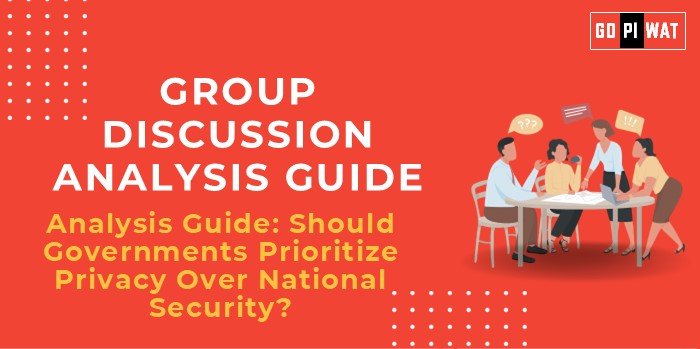📋 Group Discussion (GD) Analysis Guide: Should Governments Prioritize Privacy Over National Security?
🌐 Introduction to the Topic
Context Setting: Privacy and national security are often positioned at opposite ends of the spectrum in policy debates. As governments address complex threats, including terrorism and cyberattacks, the balancing act between safeguarding individual privacy and ensuring national security has become increasingly critical.
Topic Background: The debate dates back to the early 21st century, particularly after the 9/11 attacks, which saw a surge in surveillance activities globally. Recent advances in data collection technologies and AI have amplified concerns about privacy intrusions and data misuse.
📊 Quick Facts and Key Statistics
- 📈 Global Surveillance Spending: Estimated at $12 billion annually (2023), demonstrating its centrality to national security strategies.
- 🔒 Data Breaches: In 2023, over 1.1 billion personal records were exposed worldwide, emphasizing the vulnerability of digital privacy.
- 📊 Public Opinion: A Pew Research survey found that 56% of respondents favored some privacy trade-offs for enhanced security.
- 📜 Legal Context: The European Union’s GDPR strictly protects privacy, contrasting with U.S. laws that prioritize security in national defense.
🤝 Stakeholders and Their Roles
- 🏛️ Governments: Develop policies balancing privacy and security, often leaning towards enhanced surveillance.
- 💻 Technology Companies: Create tools for surveillance while advocating for encryption and user privacy rights.
- 👥 Citizens: Seek a balance between personal privacy and national safety.
- 🌍 Global Organizations: Establish frameworks like GDPR to uphold privacy standards internationally.
🏆 Achievements and Challenges
✨ Achievements
- 🛡️ Security Gains: Surveillance programs thwarted multiple terrorist plots, e.g., the NSA’s PRISM program (U.S.).
- 🤖 Technology Evolution: AI-enhanced monitoring systems increase predictive capabilities.
- 📜 Legislation: Laws like India’s IT Rules 2021 regulate digital platforms, enhancing accountability.
⚠️ Challenges
- 🔓 Privacy Violations: Edward Snowden’s revelations highlighted global surveillance overreach.
- 😟 Public Distrust: Growing resistance to surveillance laws, such as in protests against India’s Aarogya Setu app.
🌍 Global Comparisons
Success: Estonia combines strong encryption with secure ID systems.
Challenge: China’s surveillance criticized for heavy privacy infringements.
📚 Case Study
U.S. Patriot Act: Enhanced security but raised significant privacy concerns.
📄 Structured Arguments for Discussion
- ✅ Supporting Stance: “National security should take precedence, as threats like terrorism jeopardize lives and economic stability.”
- ❌ Opposing Stance: “Privacy is a fundamental right, and its erosion undermines democratic values.”
- ⚖️ Balanced Perspective: “While security is crucial, policies must limit privacy intrusions and ensure accountability.”
🎯 Effective Discussion Approaches
- Opening Approaches:
- 📜 “With over 1 billion personal records exposed in 2023, how can privacy still be a priority?”
- ⚖️ “In the name of security, are we sacrificing the very freedoms we aim to protect?”
- Counter-Argument Handling:
- 🔍 Privacy-first advocate: “How do you propose combating threats without surveillance?”
- 💡 Security-first advocate: “Can over-surveillance lead to authoritarianism?”
📊 Strategic Analysis of Strengths and Weaknesses
- 💪 Strengths: Enhanced national safety, technological leadership.
- 📉 Weaknesses: Erosion of trust, potential abuse of surveillance tools.
- 🚀 Opportunities: Collaborative frameworks like GDPR.
- ⚡ Threats: Cyberattacks exploiting surveillance systems.
📈 Connecting with B-School Applications
- 🌐 Real-World Applications: Policy frameworks for balancing privacy-security in governance or strategy roles.
- 🗣️ Sample Interview Questions:
- 💬 “How should organizations address the trade-off between data privacy and national security?”
- ⚖️ “What can India learn from global practices in surveillance and privacy?”
- 🎓 Insights for Students:
- Design frameworks ensuring transparency and accountability in surveillance systems.


